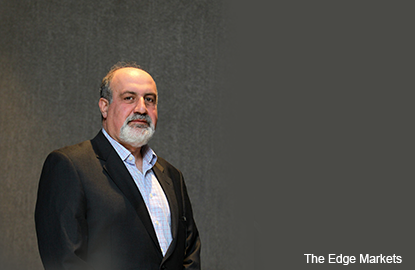
This article first appeared in Personal Wealth, The Edge Malaysia Weekly, on Nov 16 - 22, 2015.
The current volatility in global markets makes for fewer panicked investors as it forces them to underinvest. To build an antifragile portfolio, Black Swan author Professor Nassim Taleb recommends holding cash and waiting for opportunities to arise.

Will we see volatility in the global economy in the next 12 months?
I have no idea, but volatility presents risk better. The fact is that after a period of volatility, investors become a little more tolerant of risk variation. So I’m not worried about volatility. Volatility is good because it forces people to underinvest. If you have no volatility in the market and you have a million dollars, and you lose US$10,000 here and there, you are not going to be scared. But if you lose US$100,000 in a day, then you know that you have overinvested. It makes them scale down their investments.
There are fewer panicked investors because people are less exposed to markets when they are volatile. Part of my ‘antifragile’ idea is that volatility in the stock markets make people allocate less to stocks, [or at least] allocate as much as their appetite allows. They can measure their appetite to risk in the market. But when there is no volatility and one day sees a big movement, this is when it hurts and bankrupts people.
Real estate doesn’t seem to be volatile. But it has burnt a lot of investors in history. Investors tell you about New York City [where prices are going up] but not Philadelphia. It is called survivorship bias.
What is the biggest risk to global markets today?
You cannot maintain interest rates at 0%. It is not working. You have to bring it back to some natural level. If there is a problem in the market today, the Fed has nowhere to go. And there are 16 sovereign bond markets that are trading at 0% interest rate.
Central banks have been playing an unprecedented role in the global economy since the global financial crisis. What is your view?
[For real growth,] you should be talking about real things like industries — what people are inventing, what people are discovering, what people are manufacturing and who people are hiring. Unfortunately, all we talk about now is central bank policies. It is like in the hospital — you should be talking about cures and not about painkillers. If you are talking more about painkillers than remedies, it means something is wrong.
What do you think should be done?
Structural reforms are what you need to fix the problems. You should have some kind of punishment for those who make mistakes. We don’t have that. If we allowed the banks to fail [in 2008], there would be short-term pain, but long-term gain. The bonuses of banks in 2010 were higher than in 2007 in the US. It wasn’t until now that the banks are talking about compressing [payouts] a little, and only because they are making less money. The second point is that there are many good banks that were penalised by the mistakes of the big banks.
Is Islamic banking something we should be moving towards?
We should have done that because it would have reduced debt instead of transferring it to the general public. People thought it would be painful, but it wouldn’t have been. Many companies and home owners that suffered would have recovered.
Islamic banking allows some kind of debt, provided there is some equity. Some people think debt is the only form of financing. This is the biggest mistake and also the biggest argument in favour of Islamic banking. Take the industrial revolution. How much of it was based on debt? Zero. Take the modern industrial revolution. How much of it came from debt? Zero. In 2000, we had a crisis in the Silicon Valley. It was an equity crisis and it looked scary. How much debt was there? Zero. Warren Buffett complained then about internet companies. He said these people can do an IPO for a billion dollars but they can’t borrow US$5 million from the bank. He thought it was a bad thing.
So, the Islamic finance model could be a possible solution?
Islamic finance to me is a vastly more sophisticated method than a lot of the stuff you learn in business school. There is nothing new about Islamic finance as it is 3,750 years old. The mechanism of civilisation is built into this. You have to realise that it is not just Islamic. It has Babylonian, ancient Greek and Roman laws in it.
Save by subscribing to us for your print and/or digital copy.
P/S: The Edge is also available on Apple's AppStore and Androids' Google Play.